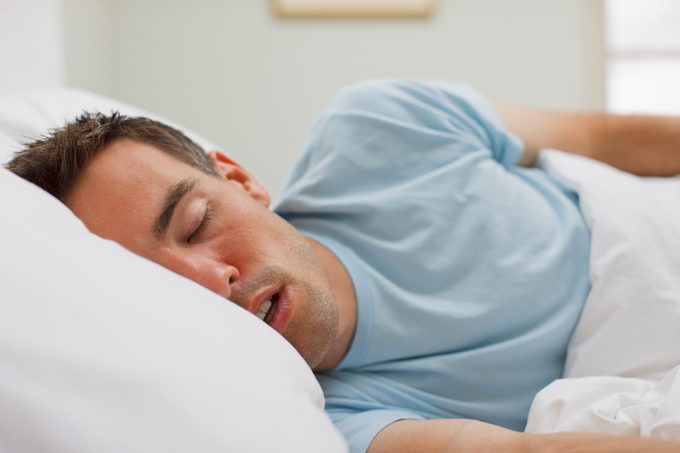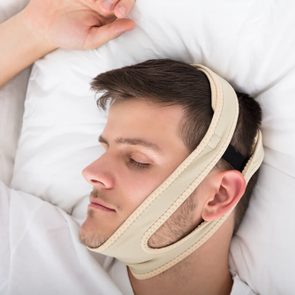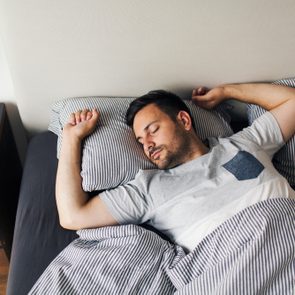Why Sitting All Day Could Make You Snore All Night
Updated: Apr. 13, 2021
We keep coming back to it: Sitting for hours at a time is bad for your health. Here's one more way that too much sitting can be harmful, but at least this one has a (relatively) simple solution.
Our editors and experts handpick every product we feature. We may earn a commission from your purchases.

If you—or a loved one—is a chronic snorer, you shouldn’t ignore those nighttime noises. Serious snoring is more than just annoying; it can be a sign of obstructive sleep apnea, a potentially dangerous sleep disorder where your breathing stops and starts while you are asleep.
Although there are plenty of home remedies to stop snoring, researchers suggest there may be another solution. A 2017 study from the National Center for Biotechnology Information sugests it might be as simple as standing up more often, or at least moving your legs more while sitting.
For the study, published in Respiratory Physiology and Neurobiology, researchers recruited 16 people who snore. All of them were healthy and none were overweight. After measuring the fluid volume in the volunteers’ calves, the researchers asked them to sit for four hours—and then tracked their snoring that night. Why the interest in leg fluid? As the researchers point out in the study: “Prolonged sitting may promote leg fluid retention that redistributes to the neck during sleep and contributes to snoring.”
The researchers also wanted to test a potential solution: Half of the volunteers pressed their feet against pedals to keep their calf muscles active while sitting; the other half let their legs hang limply the way so many of us do while sitting at a desk or on the couch. A week later, the researchers reversed the groups—the inactive volunteers pressed pedals, the pedal-pressers sat idly—before tracking nightly snoring again.
Sure enough, the volume of lower-leg fluids actually tripled when volunteers sat quietly, and they snored up a storm that night. But when volunteers worked the pedals—keeping the blood pumping and fluids moving in their calves—they had less fluid buildup, and their snoring dropped by more than half when they hit the sack.
“If there is excess fluid in the neck it will make your windpipe or esophagus more narrow,” says sleep doctor and clinical psychologist Michael Breus, PhD. When you lie down after a long day of sitting, excess fluid in the legs can flood up to the neck, compressing your windpipe. “This forces the air to move faster and this can cause a vibration and then a snore. It is an airway thickness issue,” explains Breus.
Around 30 million adults in the U.S. have obstructive sleep apnea, and about 40 percent of adult men and 24 percent of adult women are habitual snorers, according to the American Academy of Sleep Medicine. Being more active might help.
“My suggestion is to make sure that people take advantage of walking and moving whenever possible,” says Dr. Breus. “Getting up every two hours for a five-minute walk, parking your car far away to walk to work. And cycle or walk to work.” He also likes the idea of under-the-desk fitness equipment: You can get a stair-stepper, pedal exercise bike, or elliptical that can keep your calf muscles busy throughout the day.
This is just one small study, and leg exercise may not be everyone’s snoring or sleep apnea solution. If you snore, talk to your doctor or meet with a sleep specialist. In the meantime, there’s never anything wrong with getting more exercise.


